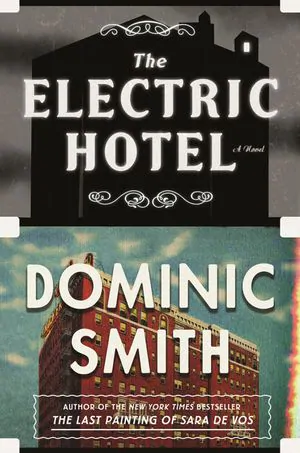
Published by Farrar, Straus and Giroux/Sarah Crichton Books on June 4, 2019
Dominic Smith invented most of the characters who populate The Electric Hotel, as well as the silent film that shares the novel’s title, but the book reads as if it were the retelling of a key moment in cinematic history. The story features a character who was, in his youth, a pioneer of filmmaking. Now he is old and the subject of an interview by a young man who is pursuing a doctorate in film studies. The filmmaker has survived war and heartbreak, but since the end of World War I, “the ruins of the past had presided over his life …. For half a century, he’d been reckless in his caution, drunk on it.” While fundamentally a story of the creative process, The Electric Hotel is also a story of how the abuses of love and war can defeat even the most lively minds.
Claude Ballard is 85 in 1962, living in Hollywood’s Knickerbocker Hotel. A young film student named Martin Embry wants to interview him about his silent film, The Electric Hotel, apparently lost but regarded as a masterpiece. Martin discovers that Claude has kept the reels of the film in his room. They are deteriorating, as is Claude.
Claude remembers his sense of marvel when he attended a demonstration of a new invention by the Lumiere brothers, a camera that made pictures move. Accepting employment as their agent, Claude began to film anything that might interest an audience, including his sister’s death. In New York, he met the French stage actress Sabine Montrose. Claude films Sabine taking a bath, falls in love, and begins a life that will overwhelm him with excitement and disappointment
Beginning with the bathing scene, Claude slowly conceives the idea of making movies, as opposed to filming things that he happens to come across. Eventually he conceives of a horror film called The Electric Hotel. He wants Sabine to star in the film, hoping that her death at the film’s end will be the symbolic death of his love.
Sabine is a diva. She has no use for love except for her love of herself, but she finds Claude to be useful and therefore uses him for her own ends. Among the novel’s touching scenes, one off the best involves Sabine’s interview with a refined woman who is dying of consumption (as Sabine will be in The Electric Hotel). That scene allows the reader to see a softer, more empathic side of Sabine, a side that she rarely reveals to others.
Other key characters include a theater owner named Bender who invests borrowed money and his future in The Electric Hotel, and a fellow named Chip who earns a living by setting himself on fire and diving into the sea. Chip is called upon to do just that as the movie’s climax is filmed, making him the first cinematic stunt man. The description of Chip’s preparation for and execution of the scene is tense, as is a surprising scene involving an untamed tiger.
The initial story is built on the travails of filming the first lengthy, plotted movie. It then imagines a legal conflict between Thomas Edison (who “would patent human breath itself if he could find the legal precedent”) and Claude, who allegedly infringed Edison’s patent on film and cameras. Edison makes threats designed to ruin a competitor, regardless of their legal merit — a technique that the business world subsequently perfected. This is the second novel I’ve read that portrays Edison as a litigious asshole and I am inclined to believe that the portrayals are accurate.
The Electric Hotel imagines that the film, an act of creation, results in the destruction of Claude, Sabine, and their relationship. The story arc traces the long road to that destruction and its aftermath, including Claude’s capture by Germans while filming World War I and his clever plan to undermine Germany’s insistence that he make propaganda films for the Kaiser. The closing chapters give a brief picture of Claude’s life after the war and explain why he has chosen to live as a recluse.
Dominic Smith tells the story in such detail that The Electric Hotel reads as a well-crafted biography. His graceful prose enlivens his characters, conveying all the tragedy that attends artistic creation, business, and love. The book captures the marvel of creativity in its infancy while reminding readers that after the act of creation is finished, the brutal world can destroy even the most gifted creators.
RECOMMENDED